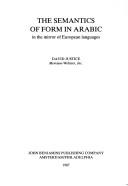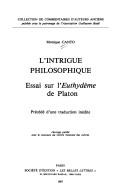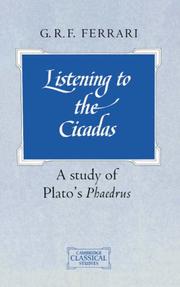| Listing 1 - 10 of 15 | << page >> |
Sort by
|
Dissertation
Year: 1987 Publisher: Liège : Université de Liège [ULg], Faculté de Philosophie et Lettres,
Abstract | Keywords | Export | Availability | Bookmark
 Loading...
Loading...Choose an application
- Reference Manager
- EndNote
- RefWorks (Direct export to RefWorks)
cinema, video --- semiologie --- rhetorique
Book
Year: 1987 Publisher: Groningen : Institut de langues romanes,
Abstract | Keywords | Export | Availability | Bookmark
 Loading...
Loading...Choose an application
- Reference Manager
- EndNote
- RefWorks (Direct export to RefWorks)
Psychologie --- Psychology --- Description (rhetorique) --- Litterature
Book
Year: 1987 Publisher: Frankfurt am Main Klostermann
Abstract | Keywords | Export | Availability | Bookmark
 Loading...
Loading...Choose an application
- Reference Manager
- EndNote
- RefWorks (Direct export to RefWorks)

ISBN: 9027230161 9027230218 128323405X 9786613234056 9027282102 9789027230164 9789027282101 9789027230218 Year: 1987 Volume: 15 Publisher: Amsterdam Benjamins
Abstract | Keywords | Export | Availability | Bookmark
 Loading...
Loading...Choose an application
- Reference Manager
- EndNote
- RefWorks (Direct export to RefWorks)
Justice's first aim in this volume is to demystify the Arabic language, which is widely perceived as difficult to learn, and has been characterised as ambiguous and confusingly polysemous. The central concern of this three-dimensional portrait of Classical Arabic is a version of the Sapir-Whorf hypothesis that language is a determinant of other aspects of culture. But rather than focusing on the possible influences of language on thought, Justice is intersted in connections between language and language use or langue and parole. Among the topics treated are: the difficulty of Ara
Arabic language --- Semantics --- Rhetoric --- Lexicology. Semantics --- Arabic languages --- Grammar --- Redekunst (Arabische). --- Arabe [Langue]. Sémantique. --- Rhétorique arabe. --- Arabisch. Semantiek. --- Arabic language - Semantics --- Arabic language - Rhetoric --- Semantics. --- Rhetoric.
Book
ISBN: 8433805363 9788433805362 Year: 1987 Volume: 2 Publisher: Granada Universidad de Granada, Departamento de Filología Latina
Abstract | Keywords | Export | Availability | Bookmark
 Loading...
Loading...Choose an application
- Reference Manager
- EndNote
- RefWorks (Direct export to RefWorks)
Phonetics --- Classical Latin language --- Latin language, Postclassical --- Rhetoric, Ancient --- Rhétorique ancienne --- Rhetoric --- Concordances --- -Classical languages --- Greek language --- Greek rhetoric --- Latin language --- Latin rhetoric --- Rhetoric, Ancient. --- Rhetoric. --- -Rhetoric --- Rhétorique ancienne --- -Ancient rhetoric --- Classical languages --- Ancient rhetoric --- Concordances. --- Postclassical Latin language --- Latin language, Postclassical - Rhetoric

ISBN: 9122008659 9789122008651 Year: 1987 Volume: 16 Publisher: Stockholm : Almqvist & Wiksell,
Abstract | Keywords | Export | Availability | Bookmark
 Loading...
Loading...Choose an application
- Reference Manager
- EndNote
- RefWorks (Direct export to RefWorks)
227.1*7 --- Brieven van Paulus aan de Thessalonicenzen --- 227.1*7 Brieven van Paulus aan de Thessalonicenzen --- Paulus (Hl.). Brief (1e) aan de Thessalonicenzen. Tekstanalyse. --- Paul (Saint). Epître (1ère) aux Thessaloniciens. Rhétorique. --- Paul (Saint). Epître (1ère) aux Thessaloniciens. Analyse textuelle. --- Paulus (Hl.). Brief (1e) aan de Thessalonicenzen. Redekunst. --- Bible. n.t. thessaloniciens, 1re --- Linguistique --- Critique et interpretation etc.

ISBN: 9023222741 9789023222743 Year: 1987 Volume: 4 Publisher: Assen Van Gorcum
Abstract | Keywords | Export | Availability | Bookmark
 Loading...
Loading...Choose an application
- Reference Manager
- EndNote
- RefWorks (Direct export to RefWorks)
Latin language --- Understatement --- Latin (Langue) --- Litotes --- Figures of speech --- Negatives --- Figures de rhétorique --- Négations --- 807.1-56 --- -Latin language --- -Understatement --- Irony --- Classical languages --- Italic languages and dialects --- Classical philology --- Latin philology --- Latijn: syntaxis; semantiek --- Understatement. --- Figures of speech. --- Negatives. --- 807.1-56 Latijn: syntaxis; semantiek --- Figures de rhétorique --- Négations --- Latin language - Figures of speech --- Latin language - Negatives

ISBN: 9062035892 9004488693 Year: 1987 Volume: vol 60 Publisher: Amsterdam
Abstract | Keywords | Export | Availability | Bookmark
 Loading...
Loading...Choose an application
- Reference Manager
- EndNote
- RefWorks (Direct export to RefWorks)
Fiction --- English literature --- Myth in literature --- Mythe dans la littérature --- Mythe in de literatuur --- Narration (Rhetoric) --- Narration (Rhétorique) --- Narrative writing --- Verhaal (Retoriek) --- -Narration (Rhetoric) --- -Narrative (Rhetoric) --- Rhetoric --- Discourse analysis, Narrative --- Narratees (Rhetoric) --- British literature --- Inklings (Group of writers) --- Nonsense Club (Group of writers) --- Order of the Fancy (Group of writers) --- Metafiction --- Novellas (Short novels) --- Novels --- Stories --- Literature --- Novelists --- History and criticism --- Technique --- Philosophy --- -History and criticism --- Narrative (Rhetoric) --- Fiction writing --- Writing, Fiction --- Authorship

Abstract | Keywords | Export | Availability | Bookmark
 Loading...
Loading...Choose an application
- Reference Manager
- EndNote
- RefWorks (Direct export to RefWorks)
Sophists (Greek philosophy) in literature --- Rhetoric, Ancient --- Sophistes grecs dans la littérature --- Rhétorique ancienne --- Plato. --- Logic --- Plato --- Argumentation --- Deduction (Logic) --- Deductive logic --- Dialectic (Logic) --- Logic, Deductive --- Intellect --- Philosophy --- Psychology --- Science --- Reasoning --- Thought and thinking --- Methodology --- Aflāṭūn --- Aplaton --- Bolatu --- Platon, --- Platonas --- Platone --- Po-la-tʻu --- Pʻŭllatʻo --- Pʻŭllatʻon --- Pʻuratʻon --- Πλάτων --- אפלטון --- פלאטא --- פלאטאן --- פלאטו --- أفلاطون --- 柏拉圖 --- 플라톤 --- Sophistes grecs dans la littérature --- Rhétorique ancienne --- Rhetoric, Ancient. --- Plato - Euthydemus

ISBN: 0521267781 0521409322 0511659202 9780521267786 9780521409322 9780511659201 Year: 1987 Publisher: Cambridge
Abstract | Keywords | Export | Availability | Bookmark
 Loading...
Loading...Choose an application
- Reference Manager
- EndNote
- RefWorks (Direct export to RefWorks)
This full-length study of Plato's dialogue Phaedrus, now in paperback, is written in the belief that such concerted scrutiny of a single dialogue is an important part of the project of understanding Plato so far as possible 'from the inside' - of gaining a feel for the man's philosophy. The focus of this account is on how the resources both of persuasive myth and of formal argument, for all that Plato sets them in strong contrast, nevertheless complement and reinforce each other in his philosophy. Not only is the dialogue in its formal structure a dovetail of myth and argument, but the philosophic life that it praises is also shaped by an acknowledgement of the limitations of argument and the importance of mythical understanding. By means of this correlation of form and content Plato invites his readers, through the very act of reading, to take a first step along the path of the philosophical life.
Plato --- Love --- Rhetoric, Ancient --- Love in literature --- Amour --- Rhétorique ancienne --- Amour dans la littérature --- Plato. --- 875 PLATO --- Classical languages --- Greek language --- Greek rhetoric --- Latin language --- Latin rhetoric --- Affection --- Emotions --- First loves --- Friendship --- Intimacy (Psychology) --- Griekse literatuur--PLATO --- Rhetoric --- Aflāṭūn --- Aplaton --- Bolatu --- Platon, --- Platonas --- Platone --- Po-la-tʻu --- Pʻŭllatʻo --- Pʻŭllatʻon --- Pʻuratʻon --- Πλάτων --- אפלטון --- פלאטא --- פלאטאן --- פלאטו --- أفلاطون --- 柏拉圖 --- 플라톤 --- Love. --- Rhetoric, Ancient. --- 875 PLATO Griekse literatuur--PLATO --- Rhétorique ancienne --- Amour dans la littérature --- Ancient rhetoric --- Arts and Humanities --- History --- Platon --- Plato - Phaedrus
| Listing 1 - 10 of 15 | << page >> |
Sort by
|

 Search
Search Feedback
Feedback About UniCat
About UniCat  Help
Help News
News